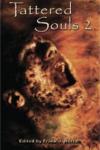Tattered Souls 2
Frank J. Hutton, Editor
Cutting Block Press
Trade Paper, 218 pages, $18.99
Review by Sheila M. Merritt
Psychically tortured individuals populate Tattered Souls 2, a fine anthology of eight stories that studies fear from odd perspectives. Included in the pages of the book are tales of: an actress who becomes transfigured by a legendary fan; a battered woman’s epistolary account that is punctuated with bruises; and a man who is propelled into action by a hematic-infused relationship. These three narratives, in terms of subject matter and execution, are extremely impressive. And are, therefore, the focus of this review.
In “Misery and Me” by Anne Michaud, a vampire love story blends addictions – blood and drugs. The language of the piece creates its own narcotic buzz; a haze more red than purple. The male protagonist comprehends the allure of his seductress, and succumbs rather like a school boy: “He fell quiet and didn’t know what to do with his hands until a brisk gust of wind blew her hair across her face, a strand getting caught on her lips. As he gently brushed it aside, his fingers touched her skin ever so slightly. Her flesh was cold. Liriel didn’t move, kept her gaze on his, testing him.” “Misery and Me” has an edgy poetry. This dance of death includes a few moves that defy conventional thematic choreography.
Skewed love is a tie that binds in Kathleen Dale’s “Becka.” The first person narrator is verbally and physically abused by the main men in her life. Becka’s low self-esteem began with beratings and beatings from her dad. Now married to an equally injurious guy, she finds some release through documenting the hurtful exchanges. Her writings disclose the inner turmoil, as well as her feelings of uneasiness concerning an unseen presence that gets riled up when she is threatened. Empowerment is near and yet oh so far, as Becka becomes emboldened by the externalization/manifestation of seething rage determined to protect her at all costs. Writer Dale does a superior job conveying the protagonist’s emotional entrapment, engaging the reader’s sympathy. When Becka feels liberated, the reader internally cheers; when the character is deflated and defeated, tears of frustration may very likely flow.
Blood, both real and fake, is what flows freely in “Mademoiselle Guignol.” Stephanie Shaw sets her tale at the notoriously gory Theatre du Grand Guignol. Paris in 1913 is in a state of transition. The Belle Époque era is giving way to artistic change reflecting more discordant times: Cubism; Stravinsky’s shocking composition “The Rite of Spring;” and a World War on the horizon. Flourishing in the midst of this cultural flux, the Grand Guignol continues to supply bloodthirsty spectators with sanguinary satisfaction. Among the regular attendees, who run the gamut of society, is a mysterious elderly Englishman. He finds the acting of Lina, known as Mademoiselle Guignol, enthralling and imbued with truth. She understands and easily accesses the tenebrous regions of the soul; a beauty who knows the bestial: “Hers was a neck made for breaking – a stem of a tragic lily blessed by a complexion so transparent one could see blood rush madly beneath it.”
Her dark, violence-filled performances are sensual to the max. Although she can reproduce an orgasm on stage by thinking of her lover, Lina dismisses sex as synonymous with death in real life: “Death, she wanted to whisper, was not erotically charged. Death was tedious and drawn out, it came to women after hard and bloody labor, to men after a lifetime of drinking and ditch digging. It ran children down in the streets via hansom cab or flu. When not monotonous, Death was almost comical in its abruptness. A misstep off the curb, a distracted butcher, a match thrown too close to the gas line. And no organ played.”
Ever the realist, Lina has seen the writing on the wall. Her life as “Mademoiselle Guignol” must end; an aging actress in a climate of shifting trends needs to make adjustments. Her final performance is laden with appropriate shocks. The audience is particularly surprised when she doesn’t appear for curtain calls, leading to speculation that perhaps a lethal accident occurred. The English admirer is puzzled and driven to investigate, setting the stage for a denouement that is indeed pure Grand Guignol.
Stephanie Shaw’s tale is highly atmospheric; displaying a keen sense of place and period. Graced with smart dialogue and memorable characters, this story along with the works of Anne Michaud and Kathleen Dale, are more than enough reason to seek out a copy of the overall excellent Tattered Souls 2.
[Editor’s Note: the Kindle edition has just been released and is available on the Kindle for $2.99 here: Tattered Souls 2 ]









